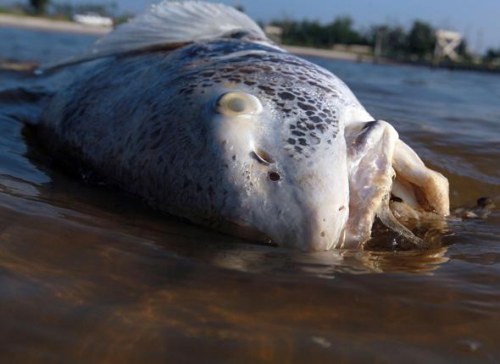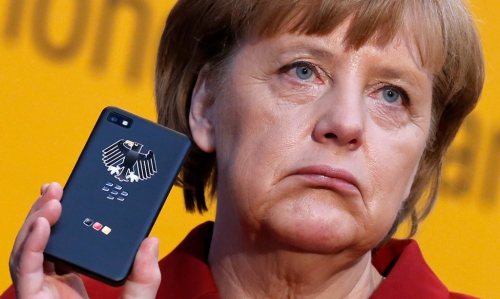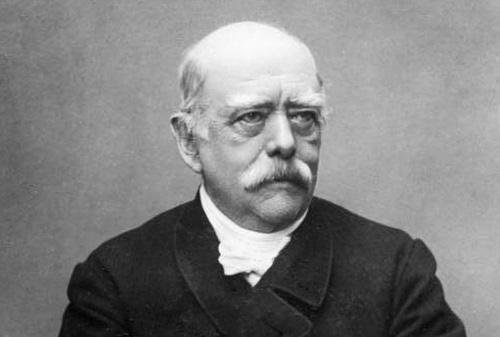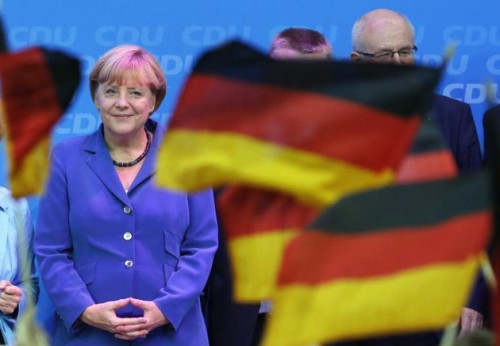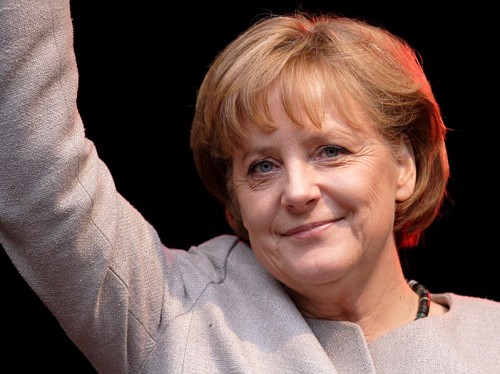Par William Engdahl
Source New Eastern Outlook
Ex: http://lesakerfrancophone.fr
Les vagues de migrants fuyant les guerres touchant la Syrie, la Libye, les attentats de Tunisie et d’autres pays musulmans déstabilisés par les Révolutions de Couleur du Printemps arabe menées par Washington ont créé le plus grand bouleversement social qu’a connu l’Union européenne depuis la fin de la Seconde Guerre mondiale. Maintenant, il est devenu clair pour la plupart que quelque chose de sinistre est en cours de réalisation, quelque chose qui menace de détruire le tissu social et l’essence même de la civilisation européenne. Ce que peu de gens réalisent, c’est que tout ce drame est orchestré, non pas par la chancelière allemande Angela Merkel ou par des bureaucrates anonymes de la Commission européenne, mais par une cabale de think tanks liés à l’OTAN.
Le 8 octobre 2015, au milieu de la vague créé par des centaines de milliers de réfugiés inondant l’Allemagne, la chancelière allemande Angela Merkel a proclamé, au cours d’un programme populaire de télévision allemande : «J’ai un plan». Elle en a profité pour critiquer vertement son partenaire de coalition, le chef de la CSU bavaroise, Horst Seehofer, un critique virulent de la politique des bras ouverts aux réfugiés de Merkel depuis le printemps 2015, qui a permis à plus d’un million de réfugiés d’entrer en Allemagne l’année dernière.
Depuis, avec une détermination d’acier, la chancelière allemande a défendu le régime criminel d’Erdogan en Turquie, un partenaire essentiel de son plan.
Le monde entier a regardé avec étonnement comment elle a ignoré les principes de liberté d’expression et a décidé de poursuivre publiquement un comédien bien connu de la télévision allemande, Jan Böhmermann, pour ses remarques satiriques à propos du président turc. Tout le monde est étonné de voir que le symbole de la démocratie européenne, la chancelière allemande, a choisi d’ignorer l’emprisonnement par Erdogan de journalistes d’opposition et sa censure des médias d’opposition turcs, alors qu’il tente d’établir une dictature de facto en Turquie. Tout le monde est resté perplexe quand le gouvernement de Berlin a choisi d’ignorer la preuve accablante qu’Erdogan et sa famille ont été matériellement complices du terrorisme d’État islamique en Syrie, qui est à la source de la crise des migrants. Tout le monde a été étonné de voir comment elle a poussé pour un engagement de l’UE à donner des milliards au régime d’Erdogan, pour soi-disant faire face à l’afflux de réfugiés dans les camps de réfugiés turcs.
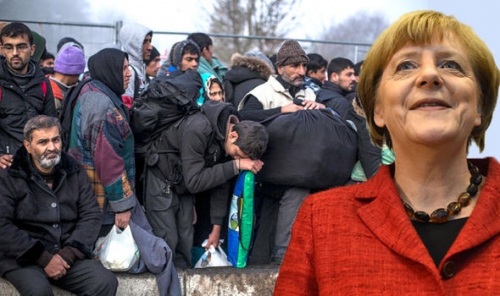
Le plan Merkel
Toutes ces actions en apparence inexplicables de la dirigeante allemand, qu’on dit par ailleurs pragmatique, semblent remonter à son approbation d’un document de 14 pages préparé par un réseau de think-tanks otaniens, effrontément intitulé Le plan Merkel.
Ce que la chancelière allemande n’a pas dit à son hôtesse, Anne Will, ou à ses téléspectateurs, c’est que son plan lui avait été fourni seulement quatre jours plus tôt, le 4 octobre, dans un document déjà intitulé Le plan Merkel, par un think-tank international nouvellement créé et, évidemment, bien financé, appelé l’Initiative de stabilité européenne ou ISE. Le site internet de l’ISE indique qu’il possède des bureaux à Berlin, Bruxelles et Istanbul.
De quoi éveiller les soupçons, car les auteurs du document ISE ont intitulé leur plan comme s’il provenait du bureau même de la chancelière allemande et non pas d’eux. Plus suspect encore est le contenu du Plan Merkel d’ISE. En plus d’avoir déjà hébergé plus d’un million de réfugiés en 2015, l’Allemagne devrait «accepter d’accorder l’asile à 500 000 réfugiés syriens enregistrés en Turquie au cours des 12 prochains mois». En outre, «l’Allemagne doit accepter les réclamations de la Turquie […] et assurer le transport en toute sécurité des candidats retenus […] déjà enregistrés auprès des autorités turques […]» Et enfin, «l’Allemagne doit accepter d’aider la Turquie à obtenir l’exemption de visa pour l’Union européenne en 2016».
Ce prétendu Plan Merkel est un produit des think tanks étasuniens et de l’OTAN liés aux gouvernements des pays membres de l’OTAN ou de membres potentiels. La maxime «suivre la trace de l’argent» est instructive pour voir qui dirige vraiment l’UE aujourd’hui.
L’Initiative de stabilité européenne (ISE)
L’ISE vient à la suite des efforts faits par l’OTAN pour transformer l’Europe du Sud-Est après la guerre des États-Unis contre la Yougoslavie dans les années 1990, qui a abouti à la balkanisation du pays et à l’établissement d’une grande base aérienne conjointe entre l’OTAN et les États Unis, le Camp Bond Steel au Kosovo.
L’actuel président de l’ISE, qui est directement responsable du document intitulé Plan Merkel, est un sociologue autrichien basé à Istanbul, Gerald Knaus. Knaus est également membre du Conseil européen des relations étrangères (ECFR), et un membre de l’Open Society.
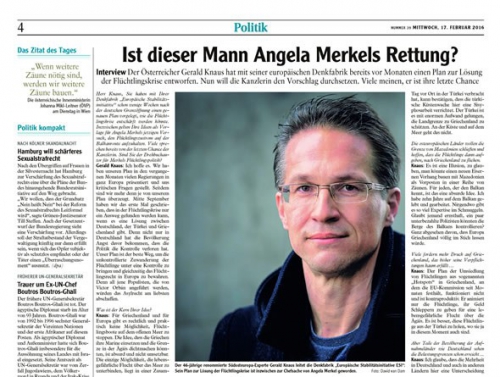
Fondée à Londres en 2007, l’ECFR est une imitation du Conseil de New York pour les Relations Etrangères, le think-tank créé par les banquiers Rockefeller et JP Morgan pendant les pourparlers de paix du traité de Versailles, en 1919, pour coordonner une politique étrangère mondiale anglo-américaine. De manière peu surprenante, le créateur et financier de l’ECFR est le multimilliardaire américain et bailleur de fonds des Révolutions de couleur, George Soros. Dans pratiquement toutes les révolutions de couleur soutenues par le département d’État américain depuis l’effondrement de l’Union soviétique, y compris en Serbie en 2000, en Ukraine, en Géorgie, en Chine, au Brésil et en Russie, George Soros et les ramifications de ses fondations Open Society ont été dans l’ombre du financement des ONG et des militants pro-démocratie, dans le but d’amener au pouvoir des régimes pro-Washington et pro-OTAN.
Les membres sélectionnés, appelés membres ou associés du Conseil de l’ECFR, basé à Londres, comptent son co-président Joschka Fischer, ancien ministre allemand des Affaires étrangères du Parti Vert, qui a obligé son parti à soutenir le bombardement illégal, par Bill Clinton, de la Serbie sans l’aval du Conseil de sécurité des Nations unies.
Les autres membres de l’ECFR sont l’ancien secrétaire général de l’OTAN, Xavier Solana. On y trouve aussi le plagiaire déshonoré et ancien ministre allemand de la Défense, Karl-Theodor zu Guttenberg ; Annette Heuser, directrice exécutive de la Bertelsmann Stiftung à Washington DC ; Wolfgang Ischinger, président de la Conférence sur la sécurité de Munich ; Cem Özdemir, président de Bündnis90 / Die Grünen ; Alexander Graf Lambsdorff du Parti libéral allemand (FDP) ; Michael Stürmer, correspondant en chef de Die Welt ; Andre Wilkens, directeur de la Fondation Mercator ; Daniel Cohn-Bendit du Parlement européen. Cohn-Bendit, connu sous le nom Danny le Rouge pendant les émeutes étudiantes de mai 1968, était un membre du groupe autonomiste Revolutionärer Kampf (Lutte Révolutionnaire) à Rüsselsheim en Allemagne, avec son proche allié, maintenant président de l’ECFR, Joschka Fischer. Les deux ont ensuite fondé la branche Realo des Verts allemands.
Les fondations Open Society sont un réseau de fondations exonérées d’impôts, créé par George Soros à la suite de l’effondrement de l’Union soviétique, pour promouvoir la démocratie et le marché libre pro-FMI et la libéralisation du marché des anciens pays communistes, ce qui a ouvert grande la porte au pillage systématique des actifs miniers et énergétiques de ces pays. Soros était un financier majeur de l’équipe économique libérale de Boris Eltsine, qui comprenait aussi l’économiste de Harvard, promoteur de la thérapie de choc, Jeffrey Sachs, et le conseiller libéral d’Eltsine, Egor Gaïdar.
Déjà, il devient clair que le Plan Merkel est en réalité un Plan Soros. Mais il y a plus, si l’on veut comprendre l’ordre du jour qui sous-tend ce plan.
Les fondateurs de l’ISE
L’Initiative de stabilité européenne est financée par une liste impressionnante de donateurs. Le site les répertorie.
 La liste comprend, en plus des Fondations Open Society de Soros, la Stiftung Mercator, une organisation liée aussi à Soros et l’organisation Robert Bosch Stiftung. La Commission européenne est aussi un des bailleurs de fonds de I’ISE. Puis, assez curieusement, la liste des bailleurs de fonds pour le plan Merkel comprend également une organisation au nom orwellien, l’Institut de la paix des États-Unis.
La liste comprend, en plus des Fondations Open Society de Soros, la Stiftung Mercator, une organisation liée aussi à Soros et l’organisation Robert Bosch Stiftung. La Commission européenne est aussi un des bailleurs de fonds de I’ISE. Puis, assez curieusement, la liste des bailleurs de fonds pour le plan Merkel comprend également une organisation au nom orwellien, l’Institut de la paix des États-Unis.
Certaines recherches révèlent que l’Institut de la paix des États-Unis a tout sauf un esprit épris de paix. L’Institut de la paix des États-Unis est présidé par Stephen Hadley, ancien conseiller au Conseil de sécurité nationale des États-Unis pendant les guerres menées par l’administration néoconservatrice Bush-Cheney. Son conseil d’administration comprend Ashton B. Carter, l’actuel ministre de la Défense de l’administration Obama ; le secrétaire d’État John Kerry ; le major-général Frederick M. Padilla, président de la National Defense University des États-Unis. Ce sont des architectes très expérimentés de la stratégie de domination militaire mondiale, dite Full Spectrum Dominance, du Pentagone.
Les auteurs du Plan Merkel, en plus des largesses des fondations de George Soros, listent comme bailleur de fonds importants le German Marshall Fund étasunien. Comme je le décris dans mon livre, The Think Tanks, le German Marshall Fund est tout sauf allemand. «C’est un think tank américain ayant son siège à Washington, DC. Son ordre du jour est la déconstruction de l’Allemagne d’après-guerre et plus largement des États souverains de l’UE, pour qu’ils s’adaptent au mieux à l’agenda de globalisation de Wall Street.»
Le German Marshall Fund de Washington a été impliqué dans la politique de changements de régime post-1990 des États-Unis, en ligne avec le National Endowment for Democracy, les fondations Soros, et le faux nez de la CIA appelé USAID. Comme je le décris dans mon livre, «l’objectif principal du German Marshall Fund, selon son rapport annuel de 2013, était de soutenir le programme du Département d’État américain pour les soi-disant opérations de consolidation de la démocratie dans les anciens pays communistes dans l’est et le sud-est de l’Europe, des Balkans à la mer Noire. De manière significative, leur travail comprenait l’Ukraine. Dans la plupart des cas, ils ont travaillé en collaboration avec l’USAID, largement identifiée comme une façade de la CIA ayant des liens avec le Département d’État, et la Fondation Stewart Mott qui donne des fonds à la National Endowment for Democracy ».
On pourra remarquer que la même Stewart Mott Foundation est aussi un bailleur de fonds du Plan Merkel, tout comme le Rockefeller Brothers Fund.
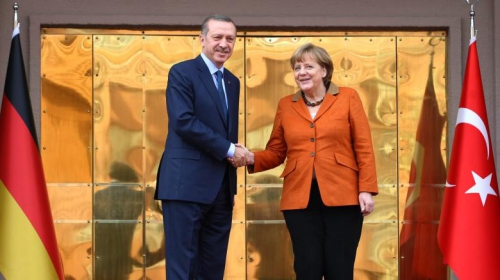
Tout cela devrait donner à réfléchir quant à savoir pour qui et vers quels objectifs est destiné l’accord Merkel-Erdogan censé faire face à la crise des migrants de l’UE. Est-ce que la faction Rockefeller-Bush-Clinton aux États-Unis a l’intention de l’utiliser comme une expérience d’ingénierie sociale importante pour créer le chaos et des conflits sociaux dans l’UE, en même temps que leurs ONG telles que la NED, Freedom House et les Fondations Soros attisent les choses en Syrie et en Libye et à travers le monde islamique ? L’Allemagne est elle, comme l’a dit Zbigniew Brzezinski, un vassal de la puissance américaine dans le monde après 1990 ? À ce jour, tout montre que c’est le cas. Le rôle des think tanks liés au États-Unis et à l’OTAN est central pour bien comprendre la façon dont la République fédérale d’Allemagne et l’Union européenne sont effectivement contrôlées au delà du rideau de l’Atlantique.
William Engdahl
Traduit par Wayan, relu par nadine pour le Saker Francophone.



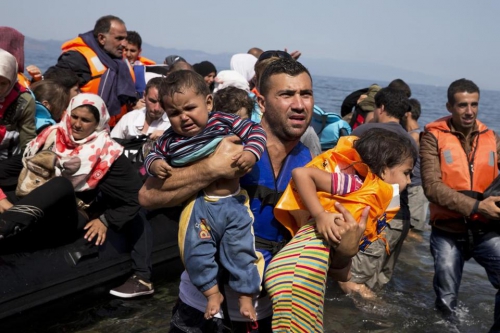

 del.icio.us
del.icio.us
 Digg
Digg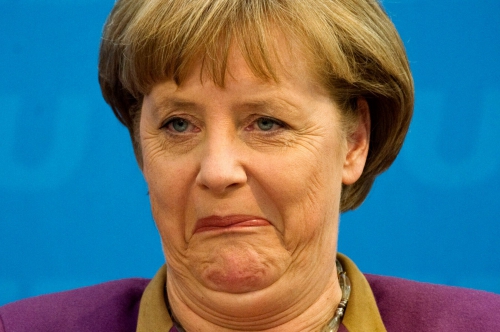
 Angela Merkel est atteinte, à son tour du syndrome de la Castafiore : "Ah ! Je ris de me voir si belle en ce miroir !". Chaleureusement félicitée, l’autre jour, par Barack Obama pour sa politique migratoire, voilà la chancelière allemande qui s’enhardit dans ses prêches moraux contre les populistes. Mardi, au lycée français de Berlin, elle a répondu ceci, à une question d’un élève qui l’interrogeait sur la montée du FN : "Je vais essayer de contribuer à ce qu’évidemment d’autres forces soient plus fortes que le Front national, pour autant qu’on puisse le faire de l’étranger". Sur la montée de l’afD dans son propre pays, elle a dit : "Nous avons assez de bons arguments pour nous confronter" à eux "sans avoir l’écume à la bouche". La Belle contre la Bête. Le problème est que Merkel, persuadée de représenter le Bien au point de s’ingérer dans la politique intérieure française, ne voit pas qu’elle est elle-même à la source, avec d’autres "humanistes" fascinés par l’Autre, de ce qu’elle dénonce. Le populisme n’est, en effet, que la réponse des peuples abandonnés par leurs élites aveuglées. Comme le démontre efficacement l’universitaire Jean-Louis Harouel (1) : "Le programme de la haine de soi et de son pays est aujourd’hui devenu la pensée officielle, imposée par le politiquement correct de la religion des droits de l’homme.". Or Harrouel l’assure, avec raison : "Les droits de l’homme, inventés par l’Occident pour protéger ses citoyens contre les risques d’arbitraire du pouvoir, sont devenus depuis un demi-siècle une religion séculière suicidaire pour les Occidentaux".
Angela Merkel est atteinte, à son tour du syndrome de la Castafiore : "Ah ! Je ris de me voir si belle en ce miroir !". Chaleureusement félicitée, l’autre jour, par Barack Obama pour sa politique migratoire, voilà la chancelière allemande qui s’enhardit dans ses prêches moraux contre les populistes. Mardi, au lycée français de Berlin, elle a répondu ceci, à une question d’un élève qui l’interrogeait sur la montée du FN : "Je vais essayer de contribuer à ce qu’évidemment d’autres forces soient plus fortes que le Front national, pour autant qu’on puisse le faire de l’étranger". Sur la montée de l’afD dans son propre pays, elle a dit : "Nous avons assez de bons arguments pour nous confronter" à eux "sans avoir l’écume à la bouche". La Belle contre la Bête. Le problème est que Merkel, persuadée de représenter le Bien au point de s’ingérer dans la politique intérieure française, ne voit pas qu’elle est elle-même à la source, avec d’autres "humanistes" fascinés par l’Autre, de ce qu’elle dénonce. Le populisme n’est, en effet, que la réponse des peuples abandonnés par leurs élites aveuglées. Comme le démontre efficacement l’universitaire Jean-Louis Harouel (1) : "Le programme de la haine de soi et de son pays est aujourd’hui devenu la pensée officielle, imposée par le politiquement correct de la religion des droits de l’homme.". Or Harrouel l’assure, avec raison : "Les droits de l’homme, inventés par l’Occident pour protéger ses citoyens contre les risques d’arbitraire du pouvoir, sont devenus depuis un demi-siècle une religion séculière suicidaire pour les Occidentaux".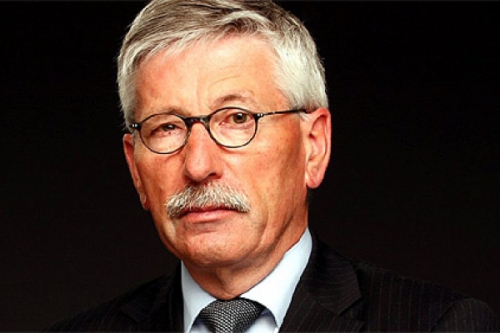
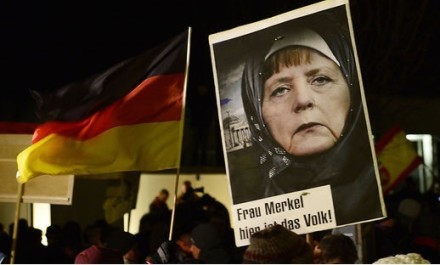
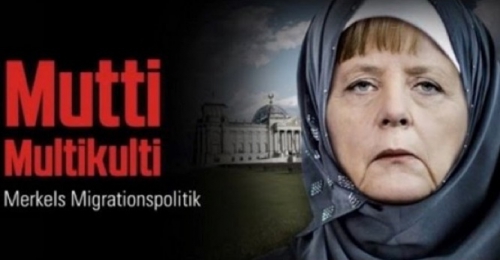
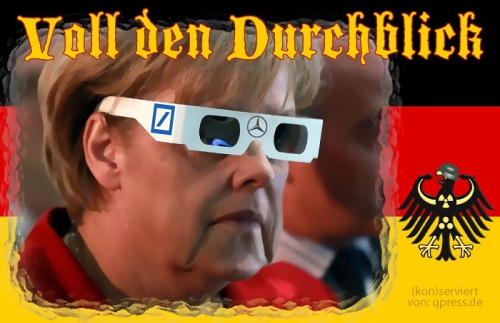
 De controverse zet in Duitsland niet alleen links tegen rechts op, maar snijdt ook doorheen de christendemocratische familie die bestaat uit de CDU van bondskanselier Angela Merkel en haar Beierse zusterpartij CSU van Horst Seehofer.
De controverse zet in Duitsland niet alleen links tegen rechts op, maar snijdt ook doorheen de christendemocratische familie die bestaat uit de CDU van bondskanselier Angela Merkel en haar Beierse zusterpartij CSU van Horst Seehofer. 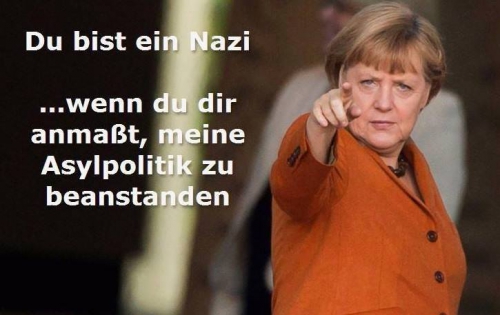
 Alzi la mano che non rida quando, il primo della classe, magari quel ‘secchione’ con gli occhiali che non perde occasione nel dimostrare la propria bravura e la contestuale impreparazione altrui, viene beccato con le mani nel sacco. In tutte le classi di tutto il mondo, quando magari un soggetto del genere viene colto impreparato è una festa per tutti e chi da mesi ha una sfilza di impreparati, improvvisamente torna entusiasta di andare a scuola. Si può quindi comprendere come mai molti italiani, alla notizia del ‘trucchetto’ della Volkswagen, hanno iniziato a ridacchiare ed a sfoderare tutta la retorica da sindrome di ultimo della classe: ‘Anche loro barano’, ‘adesso la Germania non può più dirci nulla’ oppure ancora ‘Germania Kaputt’, sono state le frasi più in voga sui social network in questi giorni. Va bene ridacchiare per le disgrazie di un paese che da anni bacchetta mezza Europa al grido di ‘austerity e rigore’, ma al tempo stesso è ben utile chiarire come in realtà la situazione non è così semplice come una banale querelle tra compagni di classe. In realtà, sulla disgrazia Volkswagen c’è ben poco da ridere e per due ragioni; in primo luogo, è da stolti oggi sfoderare retorica germanofoba.
Alzi la mano che non rida quando, il primo della classe, magari quel ‘secchione’ con gli occhiali che non perde occasione nel dimostrare la propria bravura e la contestuale impreparazione altrui, viene beccato con le mani nel sacco. In tutte le classi di tutto il mondo, quando magari un soggetto del genere viene colto impreparato è una festa per tutti e chi da mesi ha una sfilza di impreparati, improvvisamente torna entusiasta di andare a scuola. Si può quindi comprendere come mai molti italiani, alla notizia del ‘trucchetto’ della Volkswagen, hanno iniziato a ridacchiare ed a sfoderare tutta la retorica da sindrome di ultimo della classe: ‘Anche loro barano’, ‘adesso la Germania non può più dirci nulla’ oppure ancora ‘Germania Kaputt’, sono state le frasi più in voga sui social network in questi giorni. Va bene ridacchiare per le disgrazie di un paese che da anni bacchetta mezza Europa al grido di ‘austerity e rigore’, ma al tempo stesso è ben utile chiarire come in realtà la situazione non è così semplice come una banale querelle tra compagni di classe. In realtà, sulla disgrazia Volkswagen c’è ben poco da ridere e per due ragioni; in primo luogo, è da stolti oggi sfoderare retorica germanofoba. In poche parole, la Germania era pronta a fare la sua parte; una parte che, seppur invisa a molte cancelliere europee, le spetta di diritto essendo l’economia più forte del continente ed il paese più popolato d’Europa. La politica estera tedesca presenta molte lacune e molte criticità, ma al tempo stesso ‘tifare’ per un peso minore di Berlino nello scacchiere internazionale, vuol dire tagliare fuori definitivamente il vecchio continente da ogni possibile ruolo da protagonista nelle crisi principali. Ed è inoltre proprio Berlino ad avanzare perplessità su alcuni aspetti del TTIP, che invece gli americani vorrebbero far approvare in tempi brevi; tale trattato transatlantico dovrà essere ostacolato soprattutto dal movimento di opinione che da 3 anni a questa parte si sta sviluppando in tutta Europa, ma anche una Germania che avanzava perplessità poteva certamente essere un valido baluardo di difesa. L’aver lanciato le prove del trucco Volkswagen sulle emissioni di gas comunque, non è probabilmente legato direttamente ad uno dei singoli casi prima citati; esso, visto dal luogo da cui è partito (dagli USA), è probabilmente ricollegabile ad un avvertimento generale: la Germania oltre certi limiti non può andare.
In poche parole, la Germania era pronta a fare la sua parte; una parte che, seppur invisa a molte cancelliere europee, le spetta di diritto essendo l’economia più forte del continente ed il paese più popolato d’Europa. La politica estera tedesca presenta molte lacune e molte criticità, ma al tempo stesso ‘tifare’ per un peso minore di Berlino nello scacchiere internazionale, vuol dire tagliare fuori definitivamente il vecchio continente da ogni possibile ruolo da protagonista nelle crisi principali. Ed è inoltre proprio Berlino ad avanzare perplessità su alcuni aspetti del TTIP, che invece gli americani vorrebbero far approvare in tempi brevi; tale trattato transatlantico dovrà essere ostacolato soprattutto dal movimento di opinione che da 3 anni a questa parte si sta sviluppando in tutta Europa, ma anche una Germania che avanzava perplessità poteva certamente essere un valido baluardo di difesa. L’aver lanciato le prove del trucco Volkswagen sulle emissioni di gas comunque, non è probabilmente legato direttamente ad uno dei singoli casi prima citati; esso, visto dal luogo da cui è partito (dagli USA), è probabilmente ricollegabile ad un avvertimento generale: la Germania oltre certi limiti non può andare.